Exploring the Multifaceted Impact of Addiction on Families
Addiction is not a solitary struggle; it resonates through familial structures, disrupting emotional, psychological, and social dynamics. Recognizing the signs and addressing the consequences that substance abuse imposes on family relationships is crucial. This article delves into the impact of addiction on family dynamics, the unique challenges children and teenagers face, and the pathways to recovery for those affected.
Recognizing Substance Abuse and Its Impact
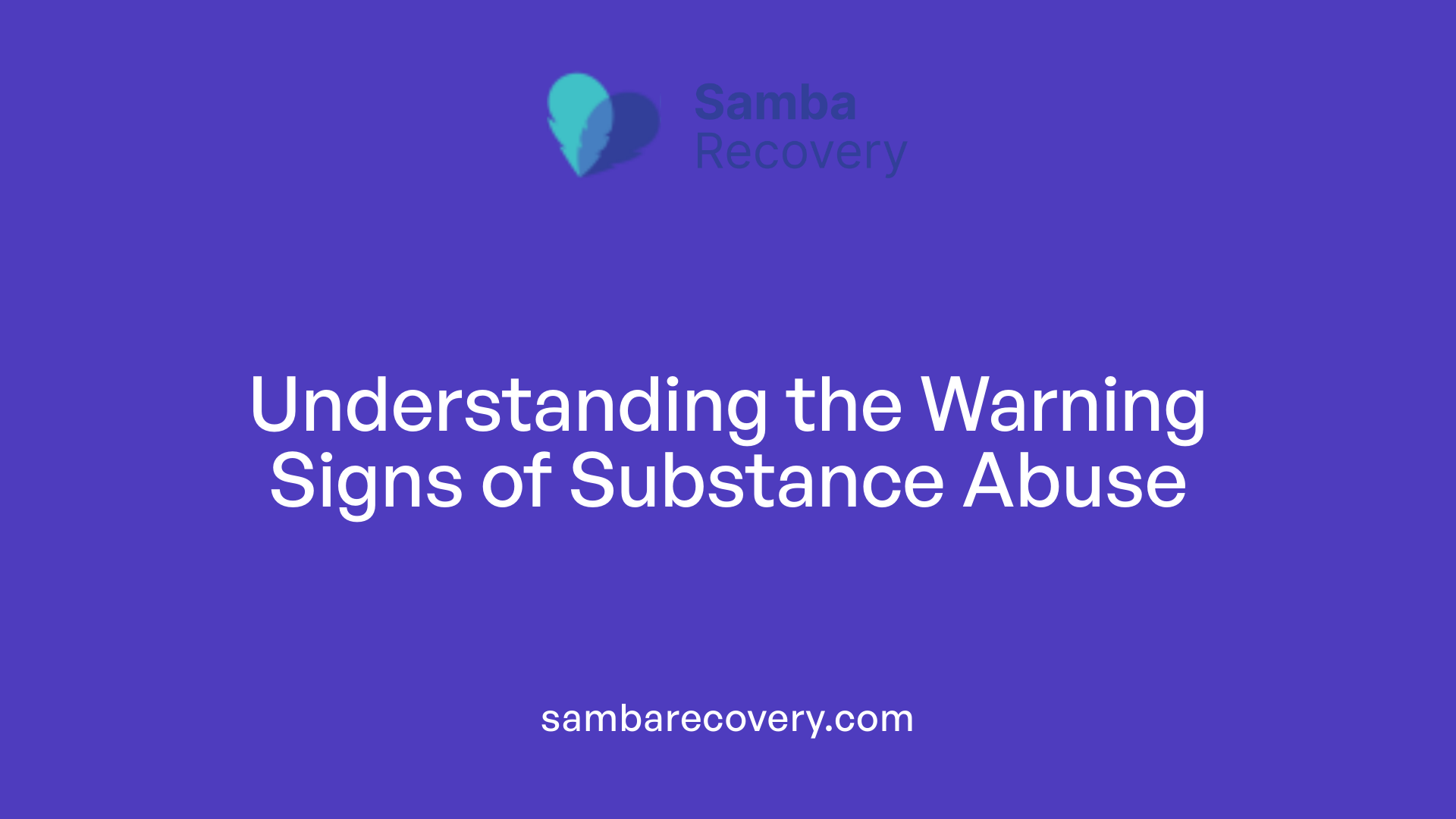
What are the signs and symptoms of substance abuse, and how does it impact family relationships?
The signs and symptoms of substance abuse can vary widely, involving both physical and behavioral changes. On the physical side, indicators may include bloodshot or glazed eyes, significant fluctuations in weight, and a noticeable neglect of personal grooming habits. Individuals may also experience withdrawal symptoms, cravings, and increased tolerance, which highlight a physical dependence on substances.
Behaviorally, those struggling with addiction often display secretive or deceptive behaviors, frequently neglect their responsibilities at home or work, and engage in risky activities, jeopardizing their safety and well-being. These changes can provoke feelings of fear, anger, and helplessness in family members who witness their loved one’s decline.
The impact on family relationships can be severe, creating a ripple effect throughout the household. Trust often erodes, leading to communication breakdowns and emotional distress. Families dealing with substance abuse may also experience social isolation, as they often shy away from sharing their struggles due to stigma. This chaotic environment can significantly hinder recovery efforts and affect each family member’s mental health, resulting in long-lasting adverse effects on their relationships and dynamics.
Dynamics of Addiction-Impacted Families
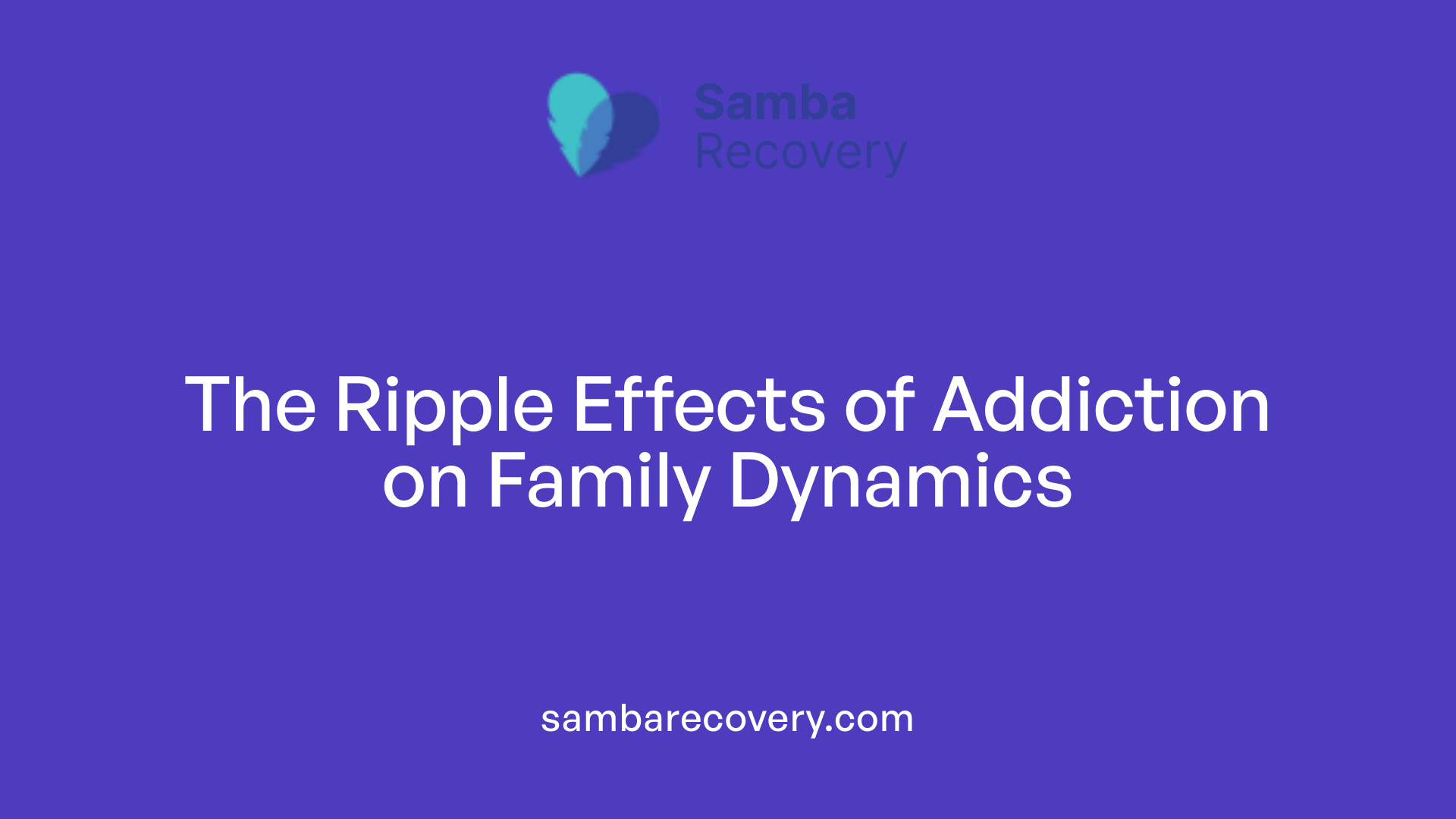
How does addiction affect family dynamics, including emotional, psychological, and social consequences?
Addiction significantly disrupts family dynamics, often creating a toxic atmosphere marked by conflict, secrecy, and poor communication. Family members deal with a spectrum of emotional consequences—from anger and sadness to chronic stress. They may grapple with feelings of guilt for perceived shortcomings or inadequacies, enhancing the emotional turmoil within the household.
Children in these homes face higher risks of emotional trauma, developmental challenges, and an increased likelihood of developing substance use disorders themselves. These outcomes stem from an unstable environment where the addicted individual often prioritizes their addiction over familial responsibilities, leading to neglect and emotional distress.
What are the social and financial consequences of addiction on families?
Financial strain is another pervasive issue faced by families impacted by addiction. Impulsive spending on substances, alongside job losses, can precipitate a cycle of financial instability. Families frequently encounter increased healthcare costs related to addiction treatment and legal fees associated with the addicted individual’s behavior.
Social consequences often involve isolation due to stigma and shame, making it difficult for families to seek help. Many families may also experience role reversals, where children are forced to assume adult responsibilities, further complicating the family structure. This collective strain fosters an environment ripe for dysfunction, making recovery a challenging endeavor.
In summary, addiction reshapes family dynamics, introducing profound emotional, psychological, and financial challenges, while also posing significant risks to the health and well-being of all involved.
Intergenerational Risks of Addiction
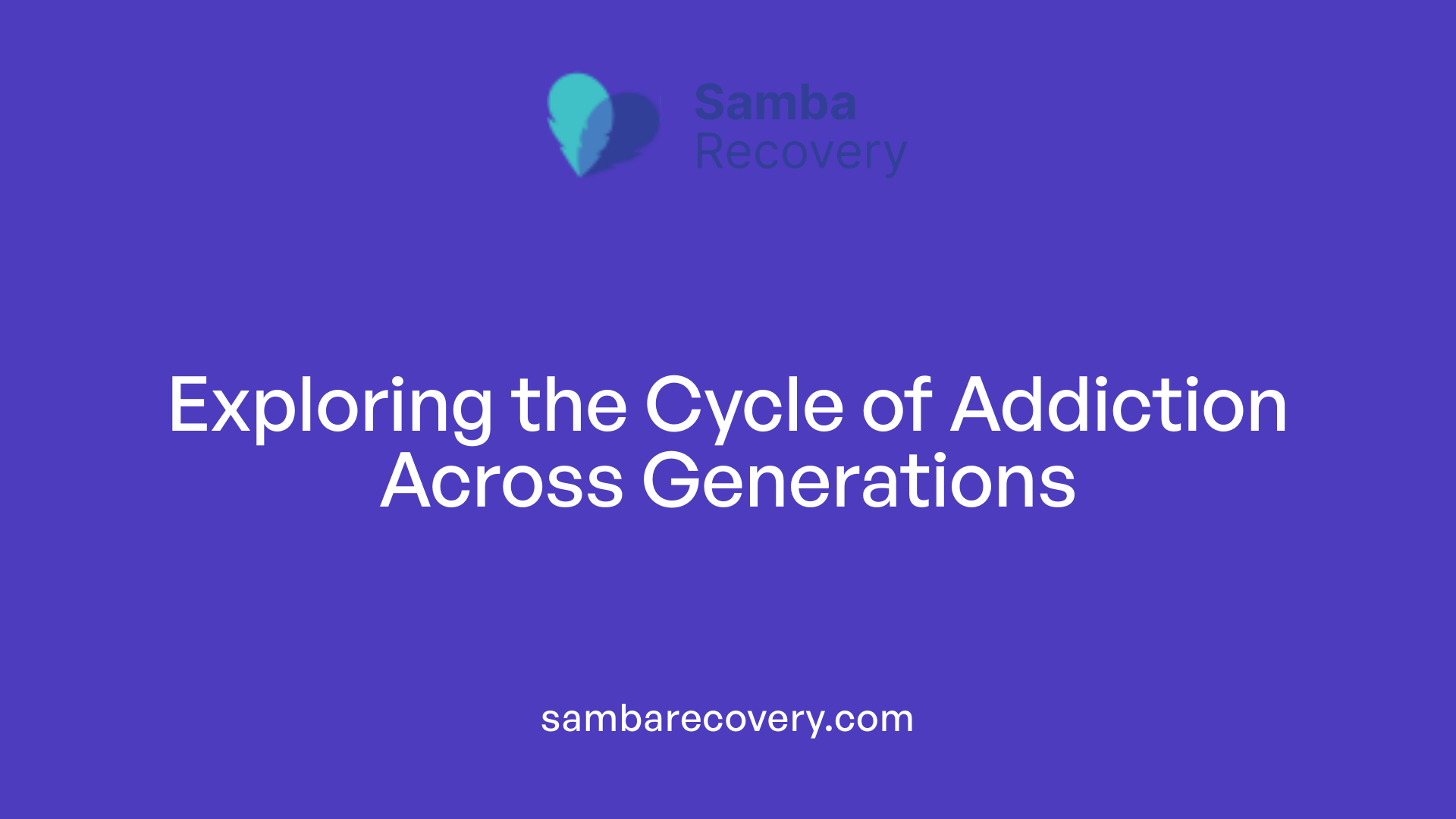
What are the risk factors for addiction within a family setting?
Risk factors for addiction within a family are multifaceted. Ineffective parental behavior, such as inconsistent discipline and lack of supervision, correlates strongly with delinquent behavior in youth. Families with a history of substance misuse or parental criminality significantly increase the likelihood of children adopting similar behaviors. Studies indicate that a notable percentage of youth with criminal backgrounds in their parents tend to engage in substance abuse themselves.
Additional challenges arise from chaotic family dynamics, which fail to provide structure and support. When children are exposed to family violence or experience childhood mistreatment, the long-term consequences may include higher risks of future substance use and criminal behavior. The cumulative effect of these risk factors creates a precarious environment for youth.
Parental influence on youth behavior
Moreover, a parent’s substance use can severely impact a child’s behavior and development. It disrupts healthy attachment patterns, leading to developmental delays and emotional distress in children. In households where addiction is present, the stability of family relationships often deteriorates. Children may assume adult responsibilities prematurely and face increased stress due to neglect or abuse, perpetuating a cycle of addiction.
In summary, addressing both risk and protective factors—such as fostering strong family ties and implementing effective parenting practices—is crucial for mitigating the risks associated with addiction in familial settings. These measures can help foster healthier environments conducive to positive youth development.
Effects on Children and Adolescents
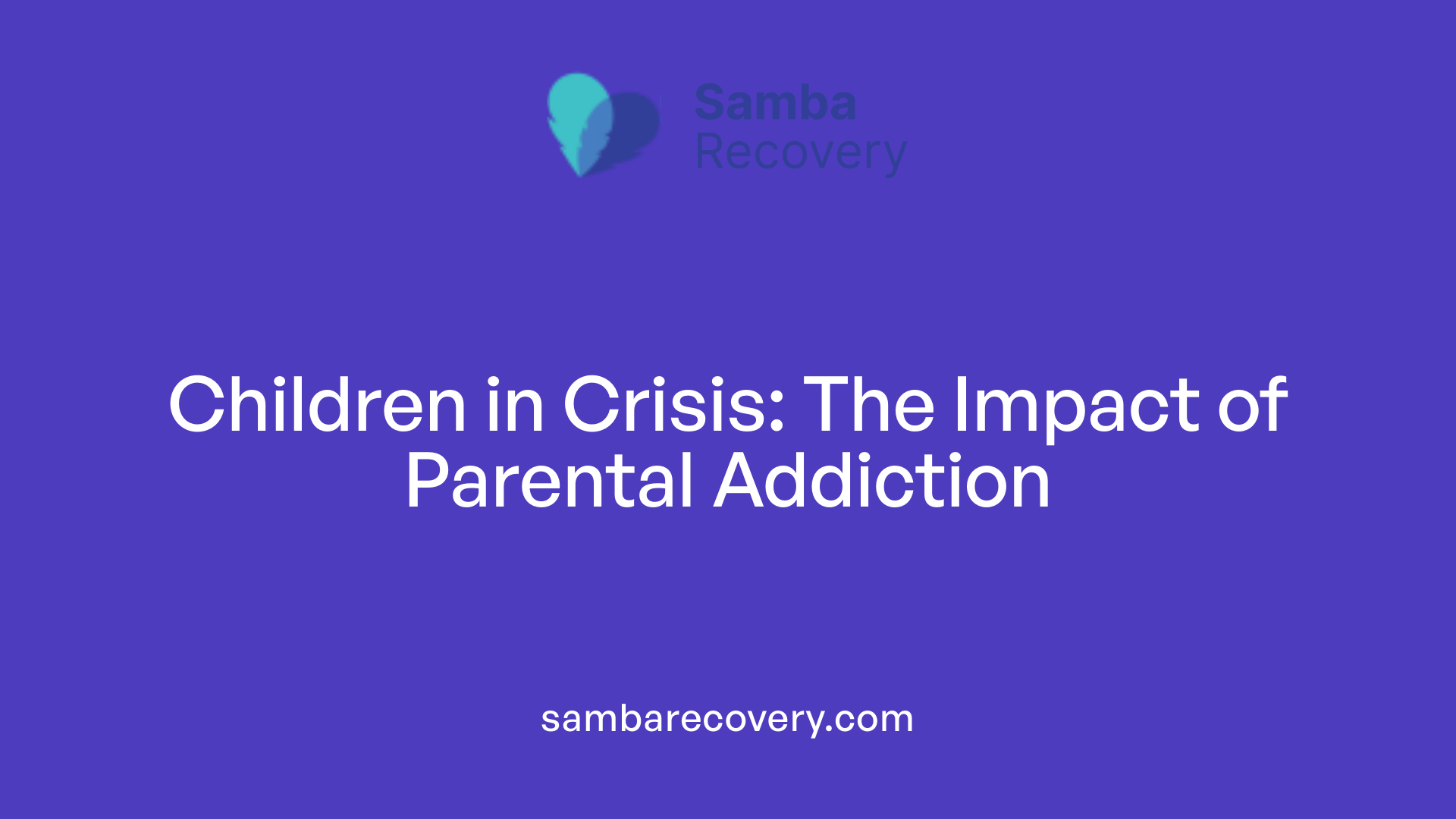
How does addiction affect children in a family?
Addiction in a family profoundly impacts children, often leaving them to navigate emotional distress and confusion in an environment that starkly contrasts with idealized family portrayals. These children may experience feelings of isolation, anxiety, and neglect, as their addicted parents struggle to meet their emotional and physical needs.
The chaos caused by addiction can have cascading effects, leading to emotional abuse and exposure to violence within the household. Financial difficulties exacerbate the situation, often resulting in threats to basic needs like food and healthcare. As a coping mechanism, children may internalize blame for their parent’s behavior, which can lead to depression and social withdrawal.
Furthermore, this instability in home life can adversely affect their academic performance, contributing to a higher risk of dropping out of school. Research has shown that children exposed to addiction are more prone to developing substance use disorders themselves in adulthood, perpetuating a cycle of addiction across generations.
Long-term implications
The long-term implications of growing up in an environment affected by addiction are profound. Studies indicate that children of addicted parents may face ongoing emotional and developmental issues, including increased rates of anxiety, depression, and difficulties in forming healthy relationships.
Their experiences during formative years can lead to conduct disorders and other mental health challenges, significantly impairing their ability to socialize and establish a secure attachment with peers and partners. As they transition into adulthood, these children frequently carry unresolved trauma, impacting their emotional regulation and overall well-being. The legacy of parental addiction highlights the urgent need for comprehensive family-based treatment approaches, ensuring that both parents and children receive support through recovery.
Role Dynamics Within the Family
Defined Family Roles in Addiction
Within families affected by addiction, specific roles often emerge, shaping the dynamics and interactions among members. These roles include:
- The Addict: The individual struggling with substance use.
- The Caretaker: Often an enabler who prioritizes the addict’s needs over their own.
- The Hero: Takes on excessive responsibility, striving to maintain family stability.
- The Scapegoat: Sometimes misbehaves to deflect attention from the addiction.
- The Mascot: Uses humor to reduce tension but avoids serious issues.
- The Lost Child: Withdraws from conflict, often feeling neglected and isolated.
Each role plays a significant part in perpetuating dysfunction within the family, making it challenging for the family to heal and address the root of the addiction.
Impact on Mental Health
The roles adopted by family members significantly affect their mental health. For instance, caretakers might experience anxiety and guilt due to their enabling behaviors, further complicating their emotional state. Heroes can feel extreme pressure from assuming too much responsibility, leading to stress and burnout.
Children of addicted parents are particularly vulnerable; they often face increased risks of trauma, emotional neglect, and mental health challenges like depression. These dynamics can create a cycle that perpetuates emotional pain and dysfunction.
Effective treatment must address these roles, facilitating healthier patterns of interaction among family members and contributing to a more supportive environment for recovery.
Understanding and reshaping these roles is crucial for fostering resilience and promoting mental well-being in families affected by addiction.
Adolescent Challenges and Lifetime Effects
What are the long-term consequences of addiction on children and teenagers within affected families?
The long-term consequences of addiction on children and teenagers within affected families are profound and multi-faceted. Emotional neglect and parental unavailability can lead to attachment disorders, often manifesting as anxiety and depression. In fact, children raised in households where substance abuse is prevalent face a grave risk of developing their own substance use disorders later in life. This risk escalates dramatically as they may experience neglect or abuse, creating a chaotic environment that disrupts their emotional and social development.
Consequently, these children may struggle with emotional turmoil that hampers their capacity to form healthy relationships. Their academic performance could also suffer due to the stress associated with their home life, leading to long-term educational and occupational challenges. Furthermore, feelings of unworthiness and shame may become entrenched, reinforcing dysfunctional relationships and contributing to a cycle of addiction and mental health issues that can persist into adulthood.
Potential Lifelong Challenges
In addition to the emotional challenges, children of addicted parents often face significant future difficulties. These may include:
- Mental Health Issues: Ongoing anxiety, depression, and other psychological disorders can manifest as they manage their inherited challenges.
- Substance Use Disorders: The risk of perpetuating the cycle of addiction is heightened: approximately 1 in 5 children in such environments will develop their own substance-related issues.
- Social Difficulties: Struggles with peer interactions and forming stable relationships may persist due to early disruptions.
The consequences are far-reaching, indicating that the effects of addiction extend beyond immediate family dynamics, influencing the long-term health and social functioning of affected individuals.
Economic and Communication Challenges
What are the financial strains and communication breakdowns caused by addiction in families?
Addiction creates substantial financial strains within families. The prioritization of substances over essential expenses can lead to a neglect of basic needs, creating cycles of food insecurity and instability for children. Families often find themselves incurring unexpected costs such as legal fees related to drug offenses and medical expenses for treatment, which further exacerbate their financial burdens. This increased spending from addiction and the subsequent loss of steady employment can drive families into dire financial situations, affecting their overall household health and well-being.
Moreover, addiction can lead to severe communication breakdowns among family members. Trust erodes as feelings of betrayal and disappointment build up, often resulting in conflict and misunderstandings. Children in these environments frequently experience heightened emotional distress and behavioral issues, reflecting the instability around them. They may assume adult responsibilities prematurely, stepping into roles that emotionally burden them. As these dynamics unfold, the overall stability and emotional well-being of the family deteriorate, creating a cycle of trauma that can persist across generations.
| Financial Challenges | Communication Issues | Long-Term Effects on Family |
|---|---|---|
| Increased spending on substances | Eroded trust | Intergenerational trauma |
| Loss of employment | Conflicts and misunderstandings | Heightened emotional distress |
| Legal and medical expenses | Premature adult responsibilities | Behavioral issues in children |
Social Repercussions on Families and Communities
What are the social effects of drug abuse on families and communities?
Drug abuse can lead to various social repercussions that fundamentally alter family structures and community dynamics. Increased criminal activities, such as theft and domestic violence, often arise from the chaotic environment created by addiction. As families struggle, the burden on community resources escalates, impacting the effectiveness of local policing and justice systems. This strain is compounded by the urgent need for support services to address the fallout from substance abuse.
Additionally, the stigma attached to addiction plays a critical role in isolating affected families. Those struggling with substance use disorders often feel alienated, which can further fracture familial relationships and inhibit seeking help. This stigma, fueled by societal perceptions and often perpetuated via social media, creates environments where individuals do not feel safe discussing their challenges.
How does social media contribute to the problem?
The normalization of drug use on social media platforms introduces another layer of complexity. Influencers and celebrities may inadvertently glamorize drug consumption, presenting it as a desirable or commonplace behavior. This portrayal can mislead adolescents and young adults, tempting them to experiment with substances without fully understanding the potential ramifications. The following statistics highlight the issue:
| Social Media Effect | Impact on Substance Use | Vulnerable Groups |
|---|---|---|
| Glamorization of drugs | Encourages experimentation | Adolescents/Young adults |
| Increased feelings of isolation | Heightened mental health issues | Individuals with addiction |
| Loss of real-world connections | Dependency on substances as coping | Families facing addiction |
Furthermore, excessive social media use has been correlated with mental health crises, including loneliness and anxiety. These emotional struggles can drive individuals toward drugs as a coping mechanism, perpetuating a troubling cycle that not only affects families but also has broader implications for community health. Thus, addressing the social consequences of drug abuse requires a concerted effort from family systems, community resources, and societal attitudes towards addiction.
Supporting Families Towards Recovery
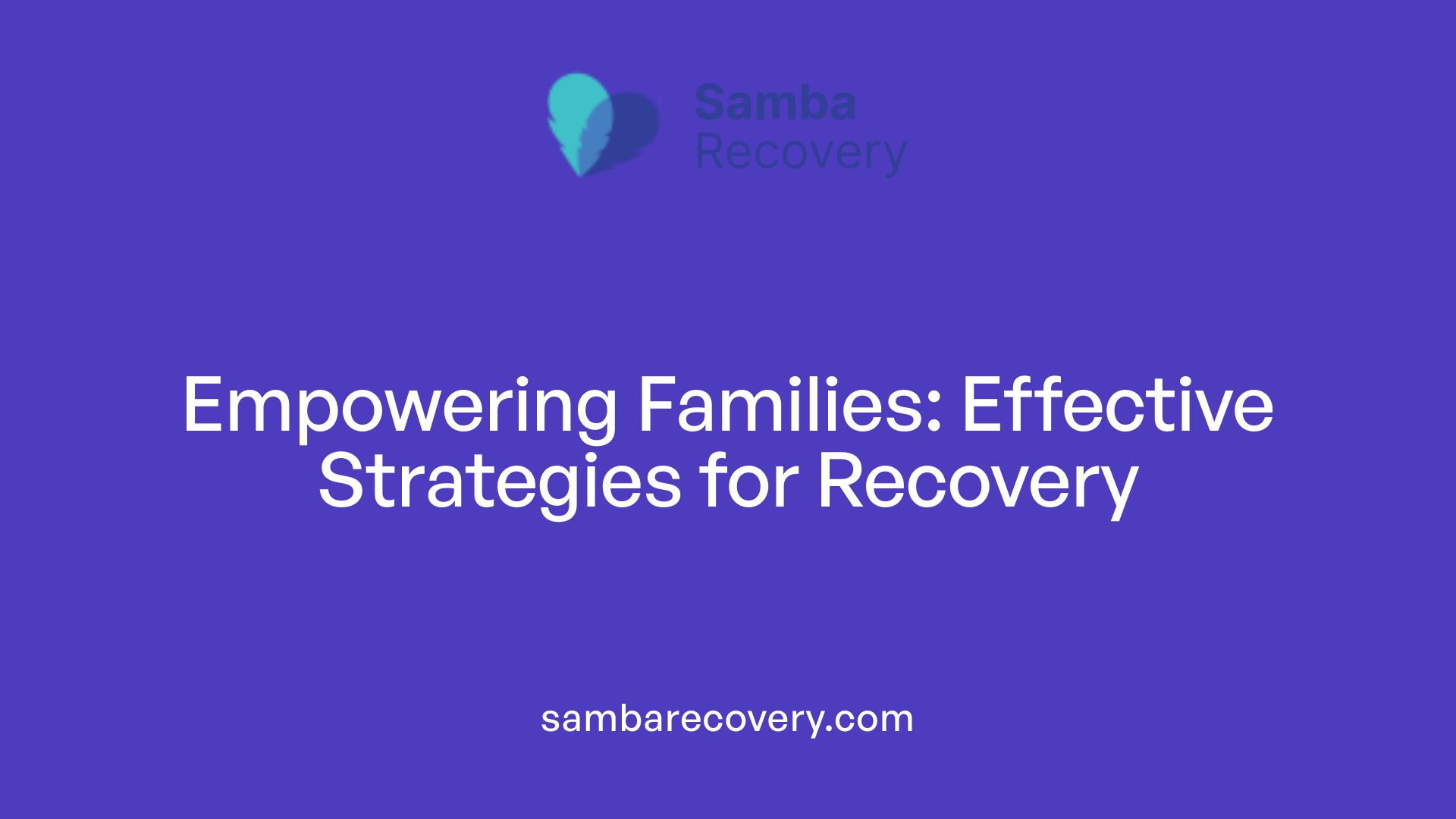
What coping strategies and recovery pathways are available for families dealing with addiction?
Families dealing with addiction can utilize several coping strategies and recovery resources. Family therapy, for instance, provides a structured space for dialogue, allowing family members to express their emotions and work through the complexities of living with addiction. By learning healthy communication skills, families can foster a supportive environment, essential for recovery.
Support groups, such as Al-Anon and Nar-Anon, can be invaluable. These groups focus on shared experiences, providing a sense of community and understanding among families affected by someone else’s substance use disorder. Additionally, psychoeducation helps family members understand the nature of addiction, which can alleviate feelings of guilt or confusion.
Resources like SAMHSA’s National Helpline are also vital. They offer referrals to local services that specialize in addiction and family support. Access to educational materials is crucial for helping families understand addiction’s impact on their loved ones and themselves.
Moreover, encouraging social support and practicing mindfulness can help family members manage stress effectively. Prioritizing self-care and establishing boundaries are essential strategies that allow individuals to maintain their wellbeing amid the turmoil created by addiction. By equipping themselves with these strategies, families can navigate the challenges of addiction more effectively, promoting healing and understanding throughout the recovery process.
Educational Support for Understanding Addiction
What educational resources are available for understanding addiction as a disease and finding support programs?
Understanding addiction as a disease is fundamental for individuals and families grappling with its effects. Educational resources from reputable organizations offer comprehensive insights and support.
- Substance Abuse and Mental Health Services Administration (SAMHSA): Offers extensive toolkits and guides for understanding addiction and navigating recovery. They also provide information on treatment options.
- American Society of Addiction Medicine (ASAM): Provides educational materials aimed at both healthcare providers and individuals looking to understand substance use disorders (SUDs) effectively.
- Grayken Center for Addiction: Focuses on comprehensive treatment solutions and community support tailored for those affected by addiction.
- National Harm Reduction Coalition: Advocates for evidence-based strategies that reduce harm and promote health within communities impacted by addiction.
- Hope and Healing Center: Concentrates on anti-stigma initiatives while providing crucial resources and support for affected families.
- #StateWithoutStigMA campaign: Aims to educate communities on addiction through anti-stigma programs.
- For educators: Numerous free lesson plans are available that cover the effects of drug use and effective prevention tactics, aiding in the development of understanding among young audiences.
These educational platforms are essential tools for families seeking to comprehend addiction as a brain disorder, empowering them while enhancing their support systems.
Conclusion: Navigating the Pathway to Healing
Understanding the profound impact addiction has on families is the first step in addressing the challenges it poses. From recognizing the signs to implementing coping strategies, it is essential for families to engage in comprehensive recovery approaches, leaning on available educational resources and support systems. Building resilience within family structures and fostering supportive environments not only aids in recovery but also breaks the cycle of addiction, leading to healthier future generations. This dedicated pathway toward healing underscores the need for open dialogue, communal support, and a collective understanding of addiction as a chronic disease affecting not only individuals but entire families.
References
- How Does Addiction Affect Families? – American Addiction Centers
- How Addiction Affects The Family
- The Impact of Substance Use Disorders on Families and Children
- The Impact of Addiction on Family Dynamics – Harris House
- How Addiction Affects Children and Families – Hanley Foundation
- How Drug Addiction Affects The Entire Family – Peace Valley Recovery
- Facing Addiction as a Family | Hazelden Betty Ford
- The Effects of Drug Addiction on Family Members – CBH
- Challenges in addiction-affected families: a systematic review of …
- Family and social aspects of substance use disorders and treatment






